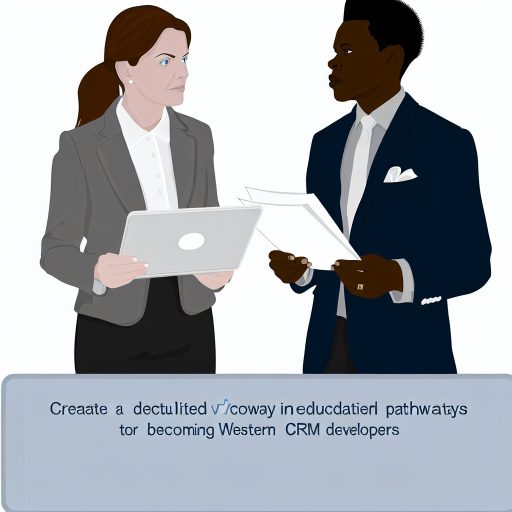Introduction
Interview tips are crucial for securing hardware engineering jobs.
The field has increasing competition.
This blog post will discuss key tips.
These tips will help you ace your next hardware engineering job interview.
Research the Company
- Understanding the company’s background and culture is crucial for success in a hardware engineering job interview.
- Look for information about the company on their official website, social media platforms, news articles, and industry reports.
- Tailor your responses during the interview to align with the company’s values, mission, and objectives.
When preparing for a hardware engineering job interview, one of the key steps you should take is to research the company where you are applying.
When you understand the company’s background, culture, and values, you can better position yourself as the ideal candidate for the role.
Here are some tips on how to effectively research the company:
Importance of Understanding the Company’s Background and Culture
By familiarizing yourself with the company’s history, products, services, and market position, you demonstrate genuine interest and enthusiasm for the opportunity.
This knowledge allows you to speak more confidently about why you are a good fit for the role and how you can contribute to the company’s success.
Tips on Where to Find Information About the Company
Start by visiting the company’s official website to read about their mission, values, leadership team, and recent achievements.
Follow the company on LinkedIn, Twitter, and other social media platforms to stay updated on their latest news and events.
Additionally, conduct online searches for news articles, press releases, and industry reports related to the company.
How to Tailor Your Responses Based on the Company’s Values
During the interview, use the information you gathered about the company to tailor your responses to showcase how your skills, experience, and values align with theirs.
For example, if the company values innovation and problem-solving, highlight your track record of developing creative solutions to complex engineering challenges.
By demonstrating a strong fit with the company’s culture, you increase your chances of standing out as a top candidate.
Investing time in researching the company before your hardware engineering job interview is a strategic move that can set you apart from other candidates.
Use the insights you gain to craft thoughtful responses that show your alignment with the company’s values and goals.
Remember, a well-prepared candidate is more likely to leave a lasting impression on the interviewers and secure the job opportunity.
Prepare for Technical Questions
When interviewing for hardware engineering jobs, it is crucial to be well-prepared for technical questions.
Employers want to ensure that you have the necessary knowledge and skills to excel in the role.
Transform Your Career Today
Unlock a personalized career strategy that drives real results. Get tailored advice and a roadmap designed just for you.
Start NowHere are some tips to help you ace the technical portion of your interview.
Importance of Brushing Up on Technical Knowledge
Brushing up on your technical knowledge is essential before any hardware engineering interview.
Make sure you are familiar with the latest industry trends, tools, and technologies.
Reviewing basic concepts and principles will boost your confidence and demonstrate your commitment to the field.
Tips for Practicing Common Hardware Engineering Concepts
- Review your resume:
Be prepared to discuss projects you have worked on and technologies you have used. - Practice with mock interviews:
This will help you get comfortable with answering technical questions under pressure. - Utilize online resources:
Websites like LeetCode, HackerRank, and GeeksforGeeks offer practice questions tailored to hardware engineering. - Collaborate with peers:
Studying with others can provide a fresh perspective and help you learn new approaches to problem-solving.
Approach to Problem-Solving Questions
- Understand the problem:
Take your time to carefully read and dissect the question before jumping into a solution. - Ask clarifying questions:
If you are unsure about any aspect of the problem, do not hesitate to seek clarification from the interviewer. - Break it down:
Divide the problem into smaller, more manageable parts to simplify the solution process. - Communicate your thought process:
Walk the interviewer through your approach, explaining your reasoning and decision-making. - Test your solution:
Before finalizing your answer, run through test cases to ensure its accuracy and efficiency. - Be open to feedback:
If the interviewer provides feedback or suggests alternative solutions, be receptive and willing to learn.
By following these tips and practicing regularly, you can feel more confident and prepared when faced with technical questions during your hardware engineering job interviews.
Remember, preparation is key to success, so invest the time and effort into honing your technical skills.
Good luck!
Explore Further: How to Stay Updated in the Penetration Testing Field
Showcase Your Projects
When interviewing for hardware engineering jobs, showcasing your projects is crucial.
Employers want to see tangible examples of your skills and experience.
- Importance of highlighting relevant projects and experiences: Make sure to highlight projects that are relevant to the job you are applying for.
- Tips for discussing your role in project teams: When talking about your projects, be sure to discuss your specific role within the team.
- How to demonstrate your problem-solving skills through projects: One of the key qualities employers look for in hardware engineers is strong problem-solving skills.
See Related Content: Cyber Forensics: Securing Digital Evidence for Court
Practice Behavioral Questions
When preparing for hardware engineering job interviews, it is crucial to practice answering behavioral questions.
These types of questions are designed to assess your past experiences and how you handle certain situations.
Importance of preparing for behavioral questions
- Helps you showcase your problem-solving skills
- Demonstrates your ability to work well under pressure
- Allows you to highlight your communication skills
- Gives the interviewer insight into your thought process
Tips for articulating your strengths and weaknesses
- Be honest and self-aware about your strengths and weaknesses
- Provide specific examples to support your claims
- Discuss how you are actively working on improving your weaknesses
- Focus on how your strengths can add value to the company
How to provide examples of past experiences
- Prepare a few key examples from previous roles or projects
- Use the STAR method (Situation, Task, Action, Result) to structure your answers
- Be concise but thorough in your explanations
- Highlight the skills and qualities that are relevant to the job you are applying for
Gain More Insights: Best Practices for Cloud Solutions Architects
Importance of Making a Good First Impression
First impressions are formed within the first few seconds of meeting someone.
It is essential to make a positive impact from the start.
How you dress and carry yourself plays a significant role in shaping this impression.
By dressing and acting professionally, you demonstrate that you take the interview seriously.
You also show that you are prepared to represent yourself and the company well.
Tips for Dressing Appropriately for a Hardware Engineering Interview
You must strike the right balance between professionalism and comfort when dressing.
Transform Your Career Today
Unlock a personalized career strategy that drives real results. Get tailored advice and a roadmap designed just for you.
Start NowHere are guidelines to help you choose the right attire.
- Stick to business casual attire unless otherwise specified.
- This typically means wearing a well-fitted suit or blazer with a dress shirt and trousers or a skirt.
- Avoid overly trendy or flashy clothing.
- Opt for classic, neutral colors like navy, black, or grey.
- Avoid distracting patterns or accessories.
- Make sure your clothes are clean, pressed, and in good condition.
- Pay attention to details like grooming, ensuring your hair and nails are tidy.
- Dress shoes should be polished and in good repair.
- Avoid wearing casual footwear like sneakers or sandals.
How to Communicate Confidently During the Interview
How you communicate during the interview is essential for making a strong impression.
Your communication must complement your professional dress and behavior.
- Practice good posture and eye contact.
- Sit up straight, lean slightly forward, and maintain eye contact with the interviewer while speaking.
- Speak clearly and confidently.
- Avoid using filler words like “um” or “like”.
- Articulate your thoughts in a concise and structured manner.
- Be prepared to discuss your experience and qualifications confidently.
- Rehearse common interview questions and practice talking about your skills and achievements.
- Listen actively and ask thoughtful questions.
- Show interest in the role and company by asking insightful questions about the team, projects, or company culture.
By dressing and acting professionally, you set the stage for a successful hardware engineering interview.
Remember to make a good first impression, dress appropriately, and communicate confidently.
Doing so will increase your chances of landing the job.
Good luck!
See Related Content: How IT Change Managers Improve IT Service Delivery

Ask Intelligent Questions
- Importance of asking thoughtful questions to the interviewer
- Tips for researching questions to ask beforehand
- How to show interest in the company and the role
Asking intelligent questions during a hardware engineering job interview is crucial for several reasons.
Firstly, it demonstrates to the interviewer that you are genuinely interested in the role.
You show that you have done your homework on the company.
Secondly, asking thoughtful questions helps you gain a deeper understanding of the companys culture.
You also learn about the companys values and expectations.
Below are some tips on how to ask intelligent questions during your hardware engineering job interview.
Importance of asking thoughtful questions to the interviewer
When you ask thoughtful questions to the interviewer, you show that you are proactive.
You also demonstrate eagerness to learn more about the company.
This can leave a positive impression on the interviewer.
It sets you apart from other candidates who may not have prepared questions.
Asking questions allows you to gather more information about the role.
You also learn about the companys expectations.
Transform Your Career Today
Unlock a personalized career strategy that drives real results. Get tailored advice and a roadmap designed just for you.
Start NowThis information helps you determine if the job is the right fit for you.
Tips for researching questions to ask beforehand
Before your hardware engineering job interview, take time to research the company.
Look at the companys website and read recent news articles about the company.
Connect with current or former employees on LinkedIn to gather insights.
Based on your research, create a list of questions to ask during the interview.
Your questions should relate to the companys goals, values, and challenges.
Avoid questions that can be answered by a quick internet search.
Ways to demonstrate interest in the company and the role
You can show interest by asking specific questions demonstrating knowledge of the companys products.
Include questions about recent projects the company has worked on.
You may also ask about upcoming product launches or industry trends affecting the company.
Additionally, inquire about the team you will be working with and the companys long-term goals.
Ask how the role contributes to the companys overall success.
Showing genuine curiosity can help you stand out as a passionate candidate.
Asking intelligent questions strategically showcases your interest in the role and company.
Prepare thoughtful questions in advance to demonstrate your knowledge of the company.
This preparation leaves a lasting impression and improves your chances of landing the job.
Remain curious, engaged, and thoughtful throughout your questioning.
Doing so shows you are qualified and enthusiastic about the opportunity.
Follow Up After the Interview
- Importance of sending a thank-you email after the interview
- Tips for reaffirming your interest in the position
- How to ask for feedback
Importance of sending a thank-you email after the interview
Sending a thank-you email after an interview is a critical step in the post-interview process.
This email allows you to express gratitude for the opportunity.
Transform Your Career Today
Unlock a personalized career strategy that drives real results. Get tailored advice and a roadmap designed just for you.
Start NowYou can also reiterate your interest in the position.
It helps you leave a positive impression on the interviewer.
Tips for reaffirming your interest in the position
In your thank-you email, seize the opportunity to reaffirm your interest in the position.
Highlight specific aspects of the job that excite you.
Share how your skills align with the role.
Express enthusiasm for the possibility of joining the team.
How to ask for feedback
When asking for feedback after an interview, it is important to be polite and respectful.
Express your gratitude for the interview experience.
Then politely inquire if the interviewer would be willing to provide feedback on your performance or areas for improvement.
Key Strategies for Excelling in Hardware Engineering Interviews
Preparation plays a crucial role in succeeding at hardware engineering job interviews.
Begin by researching the company and understanding its products and culture.
Practice common interview questions to enhance your confidence and delivery.
Showcase your technical skills clearly through examples and practical knowledge.
Demonstrate your problem-solving abilities by explaining your thought process.
Thorough preparation and consistent practice will help you stand out from other candidates.
Ultimately, these efforts increase your chances of securing the hardware engineering job you desire.




